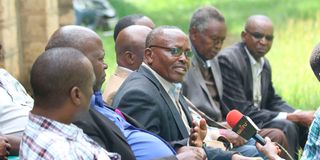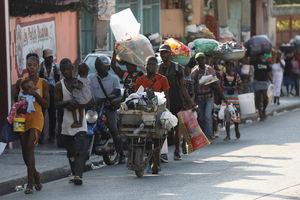The bane of traditions: How 'Giciaro' enhances SGBV in Meru

Njuri Ncheke secretary general Josphat Murangiri (centre) among other elders address a news conference at the shrine in Nchiru on December 05 2017.
What you need to know:
- The county also records about 630 new HIV infections every year, with rising numbers among the youth under the age of 25.
- According to anti-SGBV campaigners in Igembe, many cases of defilement, female genital mutilation (FGM) and rape were not finding their way into the justice system.
Perpetrators of sexual and gender-based violence (SGBV) in Meru are abusing a local custom known as ‘Giciaro’ to evade justice.
Meru has been ranked top nationally in the number of teenage pregnancies and gender-based violence with more than 9,500 teen mothers recorded in 2023.
According to NSDCC chief executive Ruth Laibon-Masha, data indicates that about 15,000 children dropped out of school in Meru between January and May this year.
“In Igembe Central, 1,700 children got pregnant between January and this month," Dr Masha said.
The county also records about 630 new HIV infections every year, with rising numbers among the youth under the age of 25.
According to anti-SGBV campaigners in Igembe, many cases of defilement, female genital mutilation (FGM) and rape were not finding their way into the justice system because of sabotage through the ‘Giciaro’ customary practice.
‘Giciaro’ is a ‘do good’ bond relationship that binds two exogamous clans with rules barring intermarriage and that demand mutual generosity.
But speaking during a community dialogue forum organised by the National Syndemic Disease Control Council (NSDCC), stakeholders cited ‘Giciaro’ custom as one of the drivers of the high cases of defilement and teen pregnancies in parts of Meru.
Under this custom, it is believed that any person who goes contrary to the 'Giciaro' dictates must encounter serious misfortunes.
“When a defilement incident happens, the perpetrator sends a person (Mwiciaro) who is bound by the 'Giciaro’ with the victim’s parents. If a Mwiciaro is sent to the victim’s family, they become fearful and cannot report to the authorities.
“The matter dies there and then. This is what is fuelling the triple threat in Meru,” Mr Joseph Gichunge, a children rights activist, said.
Njuri Ncheke Secretary general Josphat Murangiri said ‘Giciaro’ was being abused by criminals because of ignorance on how it works.
“We are working with the government to eliminate the triple threat because it may decimate our community. Let it be known that ‘Giciaro’ does not serve criminal and selfish interests.
"You cannot suffer the misfortunes linked to ‘Giciaro’ for disobeying a criminal. Do not be duped,” Mr Murangiri said.
Prof Andrew Mukaria, a theologian and researcher in African theologies, says Giciaro is supposed to avert injustices within the community, rather than upholding them.
"Giciaro was historically intended to cement bonds and resolve conflicts in a manner that restored peace within the community.
“Its foundational principles were trust and mutual respect, not manipulation to serve selfish interests, deviating from its original purpose.
"When Giciaro is invoked to protect individuals who have committed serious crimes such as defilement, it undermines justice and perpetuates harm..." Prof Mukaria says.
In Meru, Tigania East, Tigania West, Igembe Central and Igembe North, where Giciaro is revered, rank top in teenage pregnancies with more than 35 per cent of all mothers being teenagers.
Dr Masha said the high number of teen pregnancies in Meru was also driven by parental neglect.
“The NSDCC is engaging communities in Meru because the high number of teen pregnancies, HIV infections and SGBV are worrying. In the last five months, Igembe Central alone recorded 1,700 teen mothers visiting Antenatal care clinics."
"In Tigania East, 42 per cent of all mothers are teenagers. We must reverse this trend,” Dr Masha said.
Meru Health executive George Mungania said several health facilities were overwhelmed by teen and adolescent mothers in need of caesarean section.
In 2023, Meru County recorded 617 mothers aged between 10 and 14, with 219 of these coming from Tigania East.
“In most cases, the adolescent mothers cannot deliver normally and must be taken to the theatre. Some of our hospital theatres are fully booked for teen mothers. This comes with a heavy resource burden because mothers below the age of 18 are not covered by the Linda Mama insurance,” Dr Mungania said.
He called for devolution of more resources to enhance prevention of the triple threat and cushion teen mothers during antenatal care.
The NSDCC is holding a two-day community dialogue forum to identify the gaps and come up with solutions to the escalating vices.





